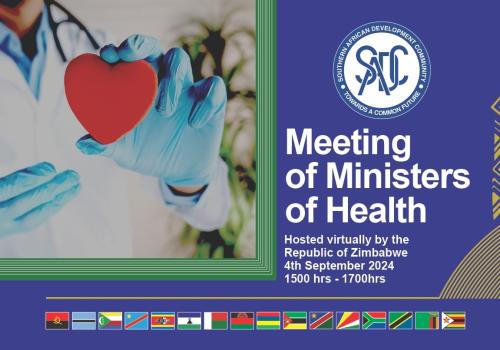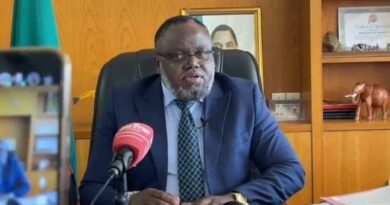SADC Ministers of Health Convene Virtual Extraordinary Meeting to Strengthen Regional Response to Mpox Outbreak
The Southern African Development Community (SADC) convened a virtual extraordinary meeting of Ministers of Health on 4 September 2024 to discuss the ongoing Mpox epidemiological situation and coordinate a regional response. The meeting focused on assessing the current outbreak, strengthening cross-border surveillance, and developing strategies for preventing further spread of the disease.
The meeting was chaired by Honourable Dr. Douglas Mombeshora, Minister of Health and Childcare for the Republic of Zimbabwe, who also serves as the Chairperson of the SADC Ministerial Committee on Health. Dr. Mombeshora emphasized the importance of early outbreak response, highlighting that lessons learned from past outbreaks, such as COVID-19 and Ebola, should be applied to the current Mpox crisis.
“Early regional outbreak response mechanisms through combined efforts remain very critical,” Dr. Mombeshora said. He urged SADC Member States to mobilize both financial and human resources to tackle the current outbreak. He also called for the deployment of health experts to countries affected by Mpox to help reduce the spread and mitigate further risks to the region.
Ms. Angele Makombo N’tumba, SADC Deputy Executive Secretary for Regional Integration, echoed Dr. Mombeshora’s sentiments, stressing that the Mpox outbreak demands a multisectoral response involving various sectors, including animal health, trade, transport, and immigration. She highlighted the challenges posed by cross-border trade, which has significantly increased in the region and can exacerbate the transmission of diseases across borders.
“The increased movement of goods and services, while a sign of improved economic cooperation, also presents a higher risk for cross-border transmission of diseases like Mpox,” Ms. Makombo N’tumba stated. She urged Member States to heighten public health surveillance, even in countries currently free of Mpox, to prevent the disease from spreading further.
During the meeting, the Ministers reviewed the regional epidemiological data on Mpox and agreed that Member States should develop and implement Multisectoral National Mpox Response Plans, integrating the One Health Approach. This approach encourages collaboration across human, animal, and environmental health sectors to address the root causes of disease transmission and ensure a holistic response.
The Ministers also highlighted the importance of strengthening regional collaboration on cross-border outbreak risk assessment and public health surveillance. They urged Member States to actively share information and best practices to improve early detection, prevention, and response measures.
Another key topic of discussion was the mobilization of domestic resources to support Mpox response efforts. The Ministers called on governments to involve the private sector in financing response strategies and developing stronger public health infrastructures. They emphasized that sustained financial support is necessary for vaccination programs, risk communication, and community engagement.
The Ministers further recommended that countries prioritize a phased vaccination rollout, targeting children and vulnerable populations first. They also stressed the importance of maintaining essential healthcare services while responding to Mpox to prevent disruption to other critical health programs.
Moreover, the Ministers urged the SADC Secretariat to collaborate with technical and financial partners, including the World Health Organization (WHO) and the Africa Centres for Disease Control and Prevention (Africa CDC), to provide support to Member States.
Both WHO African Regional Director Dr. Matshediso Moeti and Africa CDC Director General Dr. Jean Kaseya expressed their commitment to assisting SADC in its fight against Mpox. They reaffirmed their dedication to working with the region to control the outbreak and eventually eradicate the disease.
The WHO and Africa CDC have both declared Mpox as a Public Health Emergency of International Concern (PHEIC) and a Public Health Emergency of Continental Security (PHECS), respectively, underscoring the severity of the current outbreak and the need for urgent, coordinated action.
The virtual meeting was convened following a directive from the SADC Heads of State and Government at the 44th Summit held in Harare, Zimbabwe, on 17 August 2024. At the summit, leaders called for an urgent Ministerial meeting to assess the Mpox situation and facilitate a regional response. The Ministers were tasked with ensuring that the Secretariat, in collaboration with partners, regularly convenes multisectoral technical committees to monitor the situation and provide updates to the SADC Health Ministers.
In conclusion, the Ministers emphasized the need to focus on Risk Communication and Community Engagement (RCCE), infection prevention, and research efforts to develop evidence-based strategies for responding to Mpox. They also requested the mobilization of vaccines, diagnostics, and financial resources to bolster the regional response.
Finally, the Ministers acknowledged that while individual efforts by Member States are important, the real success in controlling the Mpox outbreak will come from strong regional collaboration.
Source: SADC



